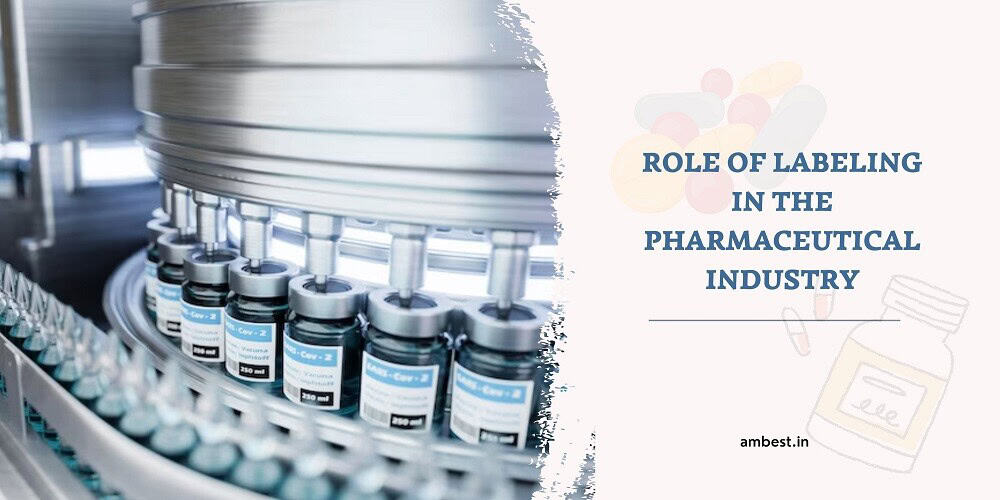Role of Labeling in the Pharmaceutical Industry
In the ever-evolving landscape of the pharmaceutical industry, ensuring the safety, efficacy, and traceability of medicinal products is paramount. One of the critical aspects contributing to these factors is labeling. Labels not only provide essential information to healthcare professionals and patients but also serve as a means of regulatory compliance and brand differentiation. In this comprehensive guide, we delve into the significance of labeling in the pharmaceutical sector, exploring its role in product identification, regulatory adherence, patient safety, and brand integrity.
- Ensuring Regulatory Compliance
In the highly regulated pharmaceutical industry, compliance with stringent regulatory standards is non-negotiable. Labeling plays a pivotal role in ensuring adherence to regulatory requirements set forth by governing bodies such as the Food and Drug Administration (FDA), European Medicines Agency (EMA), and other relevant authorities. These regulations mandate the inclusion of specific information on drug labels, such as:
- Product name and strength
- Dosage form
- Active ingredients and their quantities
- Directions for use
- Storage conditions
- Expiry date
- Lot number and batch code
- Manufacturer information
- Warning and precautionary statements
Failure to comply with these regulations can result in severe consequences, including product recalls, fines, and damage to the reputation of pharmaceutical companies. Therefore, pharmaceutical packaging companies must collaborate closely with manufacturers to ensure that labels meet all regulatory requirements.
- Enhancing Patient Safety and Understanding
Labels serve as a crucial communication tool between pharmaceutical companies, healthcare professionals, and patients. For patients, clear and comprehensive labeling is essential for understanding crucial information about their medications, including proper dosage, administration instructions, potential side effects, and contraindications. Well-designed labels with legible text, intuitive graphics, and user-friendly formatting can significantly enhance patient safety and medication adherence.
Moreover, labeling plays a vital role in minimizing medication errors, which remain a significant concern in healthcare settings. By providing accurate and easily comprehensible information, labels help reduce the risk of dosage errors, drug interactions, and other adverse events, ultimately contributing to improved patient outcomes.
- Facilitating Product Identification and Traceability
In an industry where product authenticity and traceability are paramount, labeling serves as a primary means of product identification and tracking throughout the supply chain. Each pharmaceutical product is assigned a unique identifier, typically in the form of a barcode or serial number, which is encoded into its label. This allows for seamless tracking of products from manufacturing facilities to distribution centers, pharmacies, and ultimately, to the end-user.
The implementation of serialization and track-and-trace systems enables pharmaceutical companies to monitor the movement of individual units or batches of products, thereby enhancing supply chain visibility and security. In the event of product recalls or quality issues, robust labeling systems facilitate rapid and targeted recall efforts, minimizing potential harm to patients and preserving brand reputation.
- Strengthening Brand Integrity and Differentiation
Beyond regulatory compliance and patient safety, labeling also plays a crucial role in brand integrity and differentiation within the pharmaceutical marketplace. A well-designed label not only conveys essential information but also serves as a powerful branding tool, reflecting the identity and values of the pharmaceutical company.
Pharmaceutical packaging companies in India collaborate with manufacturers to create labels that resonate with target audiences, leveraging elements such as color, typography, imagery, and messaging to differentiate products from competitors and establish a strong brand presence in the market. Consistent branding across product lines fosters brand recognition and loyalty among healthcare professionals and patients, driving market share and revenue growth.
- Partnering with Ambest Prints for Innovative Labeling Solutions
Pharmaceutical companies seeking cutting-edge labeling solutions turn to Ambest Prints, one of the top packaging companies in India. With a reputation for excellence and innovation, Ambest Prints offers a comprehensive range of labeling services tailored to the unique needs of the pharmaceutical industry.
From advanced printing technologies to specialized materials and finishes, Ambest Prints delivers high-quality labels that meet regulatory requirements, enhance patient safety, and reinforce brand identity. By leveraging state-of-the-art equipment and industry expertise, Ambest Prints helps pharmaceutical companies navigate the complexities of labeling in a rapidly evolving regulatory landscape, ensuring compliance, efficiency, and market success.
Conclusion
In conclusion, labeling plays a multifaceted and indispensable role in the pharmaceutical industry. From ensuring regulatory compliance and patient safety to facilitating product identification and brand differentiation, labels are integral to every stage of the pharmaceutical product lifecycle. By partnering with trusted packaging companies in Mumbai like Ambest Prints, pharmaceutical manufacturers can leverage innovative labeling solutions to meet regulatory requirements, enhance patient outcomes, and drive competitive advantage in the global marketplace. As the industry continues to evolve, the importance of labeling in pharmaceuticals remains steadfast, underlining its significance as a critical component of medication safety and efficacy.
For more information about Ambest Prints and its services, you can explore their official website www.ambest.in or reach out to customer support on +917583004004 or paresh@ambest.in for personalized assistance.
